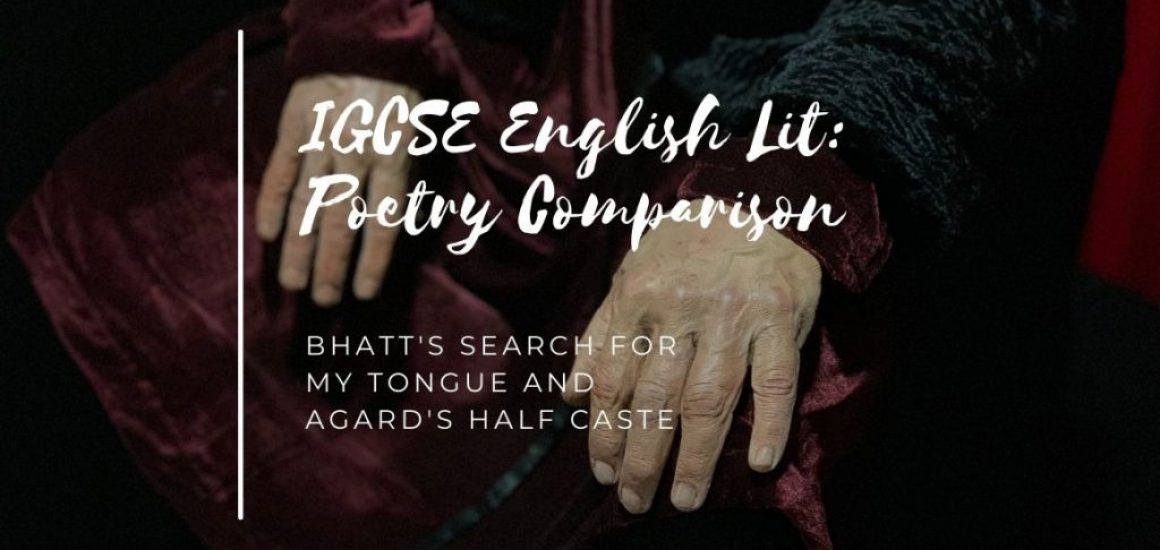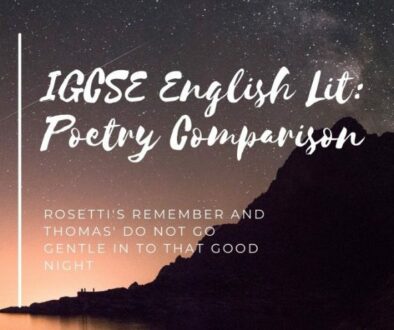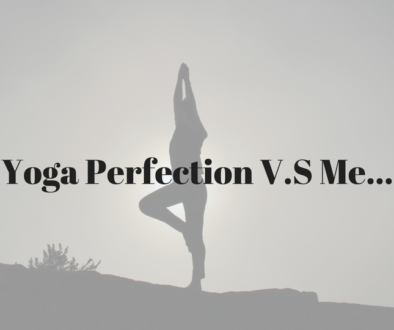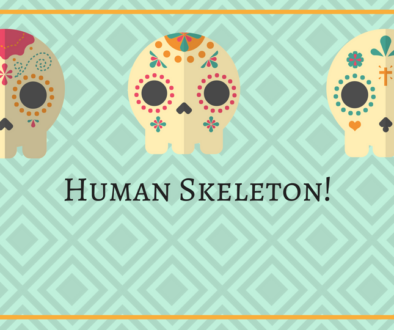IGCSE English Lit: Poetry Comparison – Bhatt’s Search for My Tongue and Agard’s Half-caste
Question: Search for my Tongue and Half-caste are both poems about cultural identity. Compare the ways the poets present their own experiences of cultural identity making reference to their attitude and use of language.


Both poems ‘Search for my tongue’ by Sujata Bhatt and ‘Half-caste’ by John Agard have the ongoing and underlying theme of dealing with cultural identity. Bhatt and Agard effectively use language, structure and form to describe and convey their experience to the reader. However, they present contrasting attitudes which in turn evoke an array of various different emotions for the reader. In this essay, I will discuss how the poets use language to present their experiences.
While both poems talk of the poets’ experience of being from a different cultural background to the one that they live in, there are stark contrasts in both poems bringing to surface various cultural differences to the attention of the reader. Agard conveys his frustration with the demeaning label ‘Half-caste’, being associated with his mixed racial heritage ‘wha yu mean when you say half-caste’. Throughout the poem his anger only boils until the end where he puts the onus on the audience to become whole in order to fully appreciate his wholeness.
Bhatt talks of the internal struggle of losing and consequently not being able to converse in her ‘mother tongue’, Gujerati. Therefore losing a ‘part of herself and her cultural identity’. This shows how the ‘foreign tongue’ has almost taken over. ‘Search for my tongue’ contrasts ‘Half-caste’ in the sense that, while Agard’s cultural identity ties in with the colour of his skin, Bhatt’s struggle is much more embedded within her as she writes of the loss of a language.
In this poem, Bhatt directly addresses the reader using second person in a crisp, clear tone. This makes them directly engage with the dilemma, and even more so stresses the difficulty and discomfort of having ‘two tongues in your mouth’. Bhatt clearly writes this piece intending it to be read, phonetically writing out the Gujerati in the third section of the poem. She abandons conventional language as well not capitalising the first letter of each line, making it a continuous sentence, symbolising the growing tongue.
Agard, however addresses and takes on the audience in an accusatory and confrontational stance effectively describing and conveying his frustrations in a somewhat roundabout manner. He also addresses the reader directly, much like Bhatt, but he approaches the audience in a much more conversational manner. Where Bhatt’s poem is intended to be read, Agard’s poem is written to be performed ‘Excuse me, standing on one leg’.
Agard mixes creole and traditional English ‘yu mean’ and ‘explain yuself’ to convey and further confirm his struggle of facing racial discrimination for being ‘half-caste’. This allows him to physically show the audience what he struggles with.
Bhatt on the other hand sympathises with the reader and tries to make the reader understand her situation by writing in an almost story-like fashion. The section in Gujerati describes the deep embedded soul of the language, allowing it to flow back to her. This contrasts and emphasises Agards dexterity in both languages.
Both poems open strongly, showing a pride for their culture and language. ‘Search for my tongue’ directly addresses the reader in a firm and authoritative, almost commanding manner using strong language, you can immediately tell the poet is in search for her identity.
Agard’s poem opens strongly, however, rather politely, this contrasts with the authoritative manner used by Bhatt ‘excuse me I am standing on one leg’. Here is presents the absurd image and opens with a comical stance, later going on to take a confrontational one which continues throughout the poem. Agard using irony and humour in this poem though the subject is of utmost important. ‘cast half a shadow’, this is an absurd but most creative idea used by Agard.
Instead of humour Bhatt in ‘Search for my tongue’ uses metaphorical language to shock the reader with graphic imagery of death. ‘Rot and die in your mouth’. The graphic and emphatic description coupled with the harsh constant ‘spit it out’ directly mirrors the struggle she faces.
Agard uses reference to Picasso and Tchaikovsky ‘mix red an green’ and a ‘half-caste symphony’. Having compared the works of Picasso and Tchaikovsky, he goes on to compare it to ‘England weather’ going on to further convey the unkindness of the remark ‘half-caste’. Unlike Agard, Bhatt uses beautiful floral imagery ‘grows back, a stump of a shoot’ this contrasts the imagery of death earlier on in the poem and Agard’s approach as a man using examples such as ‘half-a hand’ and ‘half-a-shadow’.
Bhatt uses one single stanza that wavers in line length, much like a tongue. The section in Gujerati symbolises the loss of her ‘mother tongue’ and the return and turning point of hope. She visualises the ‘mother tongue’ as it floats back.
Agard uses free verse, but the use of repetition, lack of punctuation and occasional rhyme gives the poem an emphatic rhythm and fast pace. The free verse symbolises the much wanted acceptance by the public of him being of mixed racial heritage.
Unlike ‘Search for my tongue’ the opening and closing stanzas stand apart from the rest. This gives an added impact on the audience to understand his situation ‘standing on one leg’ and his forceful request for the reader to return again. Where Bhatt’s poem ends with her getting back her ‘mother tongue’, Agard’s poem finishes open-endedly asking the reader to return.
In conclusion, both poems are contrasting in their perspectives and descriptions of their cultural identity. They both prove that cultural identity is deep within and sometimes hard to find and conquer.
26 June 2020






